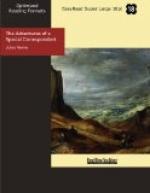What was to be done?
“Gentlemen,” said Pan-Chao, “I know how things are managed in Pekin and the Celestial Empire. Two hours will not elapse from the time Kinko is arrested to the time he is brought before the judge charged with this sort of crime. He will not only be sent to prison, but the bastinado—”
“The bastinado—like that idiot Zizel in Si j’etais Roi?" asked the actor.
“Precisely,” replied Pan-Chao.
“We must stop that abomination,” said Major Noltitz.
“We can try at the least,” said Pan-Chao. “I propose we go before the court when I will try and defend the sweetheart of this charming Roumanian, and may I lose my face if I do not get him off.”
That was the best, the only thing to do. We left the station, invaded a vehicle, and arrived in twenty minutes before a shabby-looking shanty, where the court was held.
There was a crowd. The affair had got abroad. It was known that a swindler had come in a box in a Grand Transasiatic van free, gratis, and for nothing from Tiflis to Pekin. Every one wished to see him; every one wanted to recognize the features of this genius—it was not yet known that he was a hero.
There he is, our brave companion, between two rascally looking policemen, yellow as quinces. These fellows are ready to walk him off to prison at the judge’s order, and to give him a few dozen strokes on the soles of his feet if he is condemned to that punishment.
Kinko is thoroughly disheartened, which astonishes me on the part of one I know to be so energetic. But as soon as he sees us his face betrays a ray of hope.
At this moment the carter, brought forward by the police, relates the affair to a good sort of fellow in spectacles, who shakes his head in anything but a hopeful way for the prisoner, who, even if he were as innocent as a new-born child, could not defend himself, inasmuch as he did not know Chinese.
Then it is that Pan-Chao presents himself. The judge recognized him and smiled. In fact, our companion was the son of a rich merchant in Pekin, a tea merchant in the Toung-Tien and Soung-Fong-Cao trade. And these nods of the judge’s head became more sympathetically significant.
Our young advocate was really pathetic and amusing. He interested the judge, he excited the audience with the story of the journey, he told them all about it, and finally he offered to pay the company what was due to them.
Unfortunately the judge could not consent. There had been material damages, moral damages, etc., etc.
Thereupon Pan-Chao became animated, and although we understood nothing he said, we guessed that he was speaking of the courage of Kinko, of the sacrifice he had made for the safety of the travelers, and finally, as a supreme argument, he pleaded that his client had saved the imperial treasure.
Useless eloquence? Arguments were of no avail with this pitiless magistrate, who had not acquitted ten prisoners in is life. He spared the delinquent the bastinado; but he gave him six months in prison, and condemned him in damages against the Grand Transasiatic Company. And then at a sign from this condemning machine poor Kinko was taken away.




